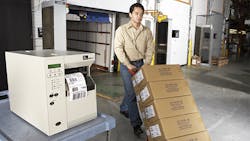SIMBA labeling system meets GS-1 standards, offers profitable tools
Dynamic Systems Inc, a Redmond WA-based provider of barcode data collection systems, has announced an affordable PTI (Produce Traceability Initiative) labeling system designed to help food processors conform to GS-1 standards and supply management with valuable tools to run their companies.
The all-in-one system is intended for growers, packers, shippers, distributors, canners, and cold storage.
In simple terms, fresh food “traceability” is the ability to find an item in the supply chain in case of a recall. The Food Safety Modernization Act action plan is to have the ability to trace products through the supply chain; take action with 24 hours of a recall; be able to contact retailers, consumers, and customers; and have a plan to remove recalled products.
PTI label requirements are being promoted by large retailers. But if the system doesn’t help manage a business and provide efficiencies, does it have any more value than printing a nice-looking label?
The SIMBA system is different. Its benefits include:
•Tracks lots in great detail, including re-boxing and commingling
•Prints PTI-compliant case and pallet labels
•Uses barcode to track finished goods and shipping
•Works in the field and in the packing plant in real-time
SIMBA can work independently or with an ERP (enterprise resource planning) system providing daily production and shipping information, traceability, and current inventory.
Designed for food processors that need accurate inventory information, SIMBA tracks, labels, and ships an unlimited number of products and records specific characteristics (type, size, grade, and weight). The system automatically generates bills of lading and verifies shipments, which eliminates charge-backs. It does all of this on the production floor using current touch screen and barcode technology.
At the time of shipping, the van loading feature of SIMBA tracks each carton or pallet onto a specific van. A bill of lading is then produced automatically. This feature not only saves time in the shipping process, but it also eliminates disputes with the customer regarding what was actually shipped.
A user can start with SIMBA Basic and upgrade as processes and business change.
Key results from implementing the SIMBA software include increased production speed; the ability to get same-day, accurate production reports; fulfill traceability requirements; have accurate inventory; professional-looking carton and pallet labels, improved productivity; and expedited van loading.
Access http://dynamic-systemsinc.com/ to learn more.
